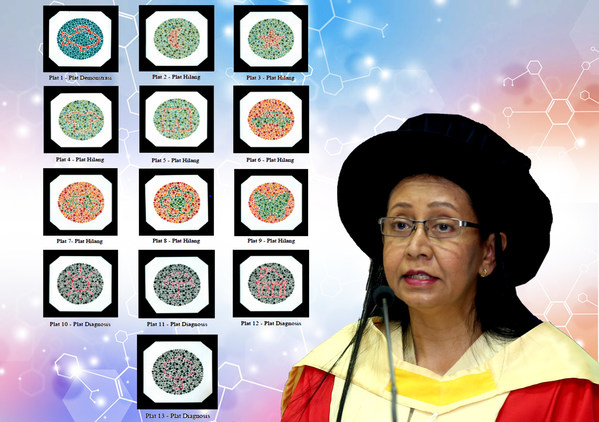Academic Stress and Emotional Well-Being in Students with Colour Vision Deficiency
KUALA LUMPUR,Malaysia,March 7,2022 -- Head of Optometry and Vision Science Programme from the Faculty of Health Sciences,Universiti Kebangsaan Malaysia (UKM),Prof Dr Sharanjeet Kaur Malkeet Singh found that students with congenital colour vision deficiency have emotional problems and poor academic performance,affecting their quality of life in a long run.

Prof Dr Sharanjeet Kaur Malkeet Singh developed an easy-to-understand colour deficiency screening test that can be used on pre-school students before they started school.
According to her,congenital colour vision deficiency,also known as congenital colour blindness is an incurable and non-progressive impairment that puts the affected person at a distinct disadvantage when performing specific visual tasks.
She conducted a research involving primary and secondary school colour-deficient students in Malaysia aged seven to 17 on their academic performance and emotional well-being.
"Colour is particularly important in the educational system. It appears in nearly 80 percent of learning materials.
"Educators are becoming increasingly reliant on online educational resources. As a result,a lot of important information may be difficult to convey to colour-deficient students.
"Students are found to learn something better when exposed to visual stimuli,such as bright colours. Colours in teaching materials improve classroom learning efficiency,allowing information to be conveyed more quickly and effectively.
She explained that colour-deficient students are slower to follow instructions and appear hesitant when faced with colour-related decisions. They also struggle in school subjects such as chemistry,biology,physics,mathematics,and natural sciences in general.
She added that primary school students (aged seven to 12) with congenital colour vision deficiency are found to be very sensitive,prefer to be alone and have short attention spans.
"They are also found to have poor academic performance,with the majority of them being in lower-level classes.
"Meanwhile,secondary school students (aged 13 to 17) with colour vision deficiency are found to have internalising behaviour problems,low self-confidence,lack of participation in class and inability to concentrate.
"Students with congenital colour vision deficiency are embarrassed when they fail to identify colours correctly,which leads to them being misunderstood as slow learners and ridiculed by teachers and peers. This makes for a challenging educational and learning environment for them.
"Additionally,students with congenital colour vision deficiency are also depressed and don't understand why they can't follow their lessons because they are unaware of their problems," she said.
Prof Dr Sharanjeet further explained that 84 percent of primary school students' parents and 88 percent of secondary school students' parents are unaware that their children are colour-deficient,according to the study's findings.
"Colour-deficient symptoms in children must be recognised by parents and teachers in order for them to be identified and treated.
"The most common symptoms are difficulty in distinguishing and identifying colours,inability to concentrate for long periods of time,particularly when colouring,taking a long time to complete a colour-related assignment,making a mistake while colouring,and frequently selecting food.
"Mandatory vision screening in schools in most countries,including Malaysia,does not include screening for colour vision deficiency. In addition,screening tests to detect colour vision deficiency are less suitable for children who have just started school," she said.
In addressing the issue,Prof Dr Sharanjeet has developed an easy-to-understand colour deficiency screening test that can be used on pre-school students.
Teachers can administer the test in schools,and a colour vision screening training module has been developed for this purpose.
She also urged that colour vision screening be included in school vision screening,school teachers be educated about congenital colour vision deficiency,and parents and society be made more aware.
"With this effort,it is hoped that students with colour vision deficiency will be identified as early as possible,allowing them to participate fully in the learning process.
"Despite their small numbers,everyone has the right to an education and a balanced well-being," she concluded.